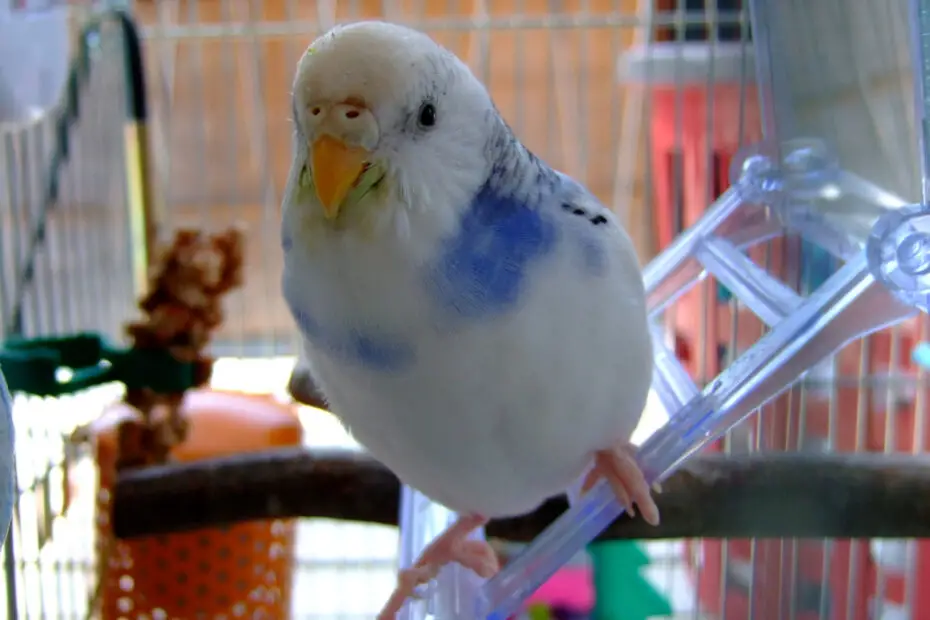Budgies or parakeets are popular pet birds for their playful personalities and colorful plumage. These tiny birds are native to Australia but have become beloved pets worldwide due to their charming demeanor and low-maintenance care requirements.
However, despite their reputation as easy-to-care-for pets, it is crucial to ensure that your budgie receives proper nutrition and hydration to maintain their health and well-being.
So, how should I feed and water my budgies? Budgies need a mix of seeds, pellets, fruits, and vegetables. You should also provide mineral supplements and fresh water to meet their nutritional requirements.
Proper nutrition is essential for budgies to maintain their energy levels, support healthy growth, and strengthen their immune systems. A lack of adequate nutrition and hydration can lead to various bird health problems, such as weakened immune systems, malnutrition, kidney damage, and obesity.
Many pet owners are unaware of their budgies’ specific pet care needs and feed them an unbalanced or unsuitable diet. This article aims to provide comprehensive information on feeding and water budgies, including an overview of their nutritional requirements, feeding habits, and hydration needs.
By following the guidelines outlined in this article, you will understand bird behavior which will help you ensure that your budgie remains healthy and happy.
Understanding Budgie Nutrition
As a pet owner, you are responsible for providing your budgie with a well-balanced diet that meets their nutritional needs. Let’s now discuss the dietary requirements of budgies and how to ensure that your bird gets the nutrients they need to thrive.
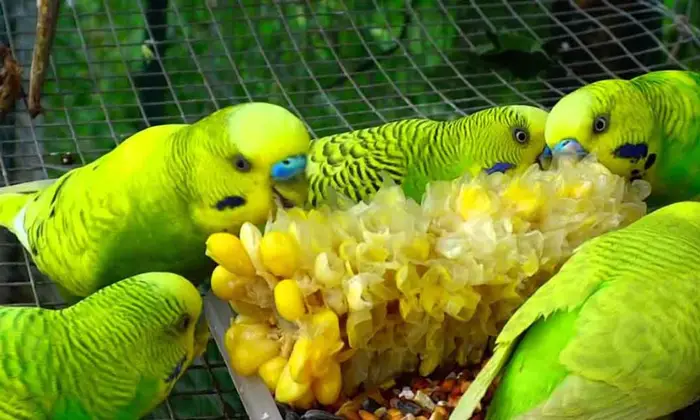
Nutritional Requirements of Budgies
Proper nutrition for budgies includes protein, fat, carbohydrates, vitamins, and minerals.
- Protein is an essential nutrient for budgies, as it helps them grow, repair, and maintain their body tissues. Budgies require approximately 12 to 18 percent of their diet to be protein. The best sources of protein for budgies are legumes and boiled eggs.
- Fat is also an important nutrient. Budgies require around 5 to 10 percent of their diet to be fat. Good fat sources include millet, canary grass seed, hemp seed, and nuts.
- Carbohydrates are another essential nutrient for budgies. They are the primary energy source for the bird’s body and should make up around 50 percent of its diet. Good sources of carbohydrates include fruits, vegetables, grains, and seeds.
- A well-formulated pellet diet is another option and is a good substitute for seeds. It is also a good source of vitamins and minerals.
- Vitamins and minerals are essential for proper body function and bird metabolism. Vitamins such as A, D, and E are critical for budgies. They can be found in many different types of fruits and vegetables and should comprise 10%-20% of the diet. Some safe fruits and vegetables for budgies include apples, bananas, blueberries, carrots, celery, and spinach.
- Other budgie food types may include minerals such as calcium and phosphorus. They are essential for bone health and can be found in eggshells, cuttlebone, and mineral blocks.
Introducing New Foods And Monitoring Budgie Health
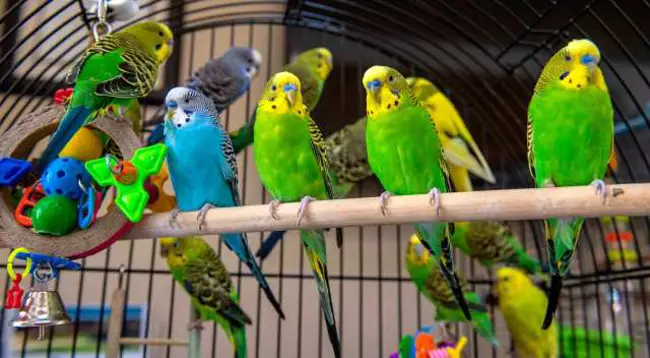
Understanding bird digestion is essential when introducing new foods to your budgie’s diet.
- Start by offering a small amount of the new food and monitor your bird’s reaction. If your budgie is not interested in the new food, continue to provide it alongside their usual food. Over time, your budgie may show interest in the new food.
- In addition to introducing new foods, regular weigh-ins can help you track weight changes, indicating overfeeding or underfeeding. You should also keep an eye on your budgie’s droppings, as changes in color or consistency can be a sign of digestive issues or other health problems.
Sometimes, you may need to adjust your budgie’s diet to address specific health issues. For example, if your budgie is overweight, you may need to reduce their overall food intake and limit their intake of high-fat foods.
Feeding Your Budgie
Here are some guidelines on how to feed your budgie properly.
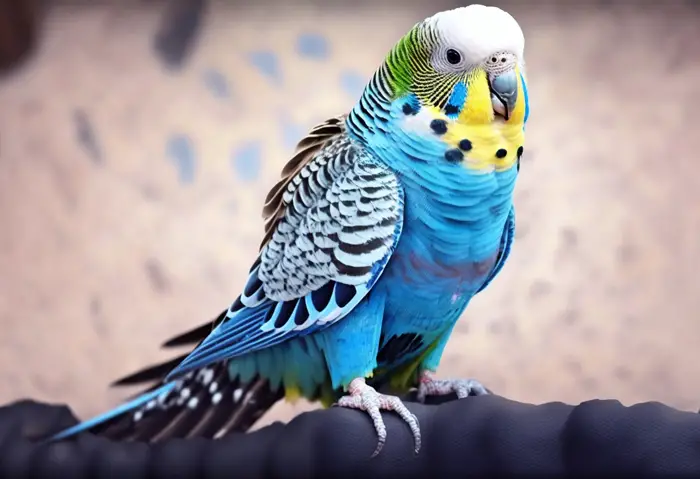
Overview Of How To Feed Your Budgie
- It is recommended to provide the budgie with food twice daily, morning and evening, and to monitor their eating habits to ensure they are eating enough.
- Regarding the amount of food, the general rule of thumb is to provide a quarter to half a teaspoon of seed mix or pellets per budgie per feeding.
- However, the feeding schedule depends on the bird’s age, activity level, metabolism, and budgie species and breeds.
For example, larger budgies, such as the English Budgie, may need more food and may benefit from more frequent meals. On the other hand, smaller budgies, such as the American Budgie, may do well with two meals a day.
Consult with your veterinarian or an avian nutritionist to determine the best diet for your budgie based on its specific needs.
Different Methods Of Feeding
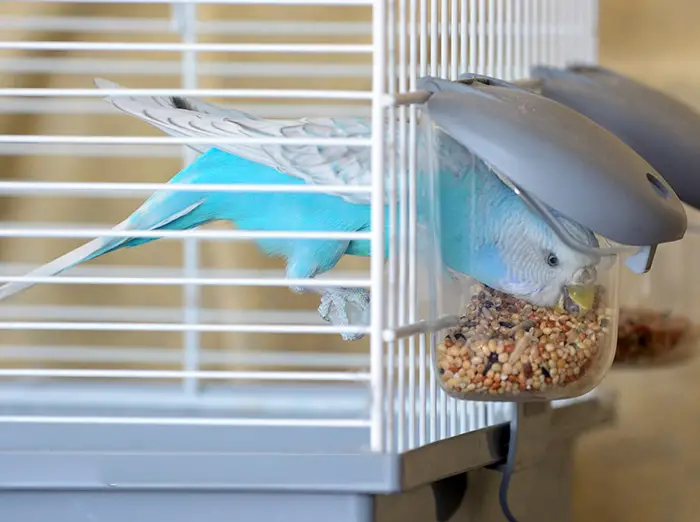
There are two main feeding methods for your budgie: free-feeding and meal-feeding.
1. Free-feeding
Free feeding provides food to your budgie in a bowl filled with food. This means that the budgie has access to food and can eat whenever it feels like it.
The advantage of free-feeding is that it allows your budgie to eat whenever it is hungry. Additionally, it can be convenient for owners who may not have time to regularly monitor and feed their budgies.
However, the disadvantage of free-feeding is that it can make it challenging to monitor your budgie’s food intake. This may make it hard to detect if it is eating enough or overeating.
Additionally, budgies may selectively eat only certain types of food if given free access, which can lead to an imbalanced diet if not varied enough.
2. Meal-feeding
Meal feeding provides food to your budgie at specific times of the day, usually in the morning and evening. This allows the owner to control their budgie’s food intake and helps monitor its diet more closely.
The advantage of meal-feeding is that it will enable better diet diversity, as the owner can ensure that their budgie receives a balanced meal with various types of food.
The disadvantage of meal-feeding is that the owner requires more time and effort to ensure that their budgie is fed at the appropriate times.
It can also be stressful for budgies used to free-feeding, leading to behavioral issues such as aggression toward their owners. As a result, it is up to you to decide which is best based on the budgie feeding habits.
How To Provide Treats And Supplements
In addition to the main meal, you must provide your budgies with treats and additional supplements. However, it’s essential to offer them in moderation and with consideration for your budgie’s dietary needs.
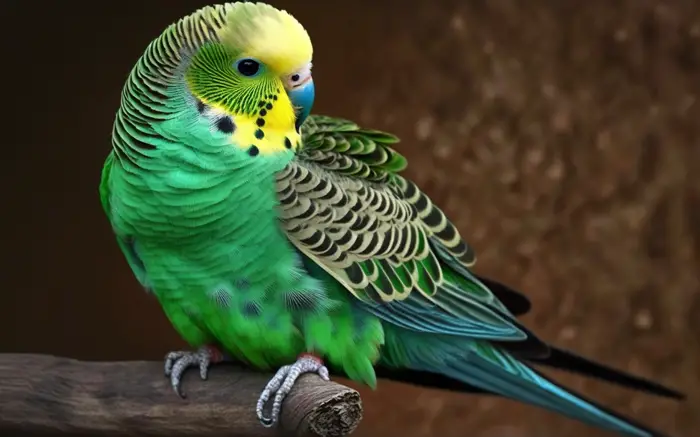
Regarding treats, choosing safe and healthy items for budgies is vital.
- Avoid offering human foods high in salt, sugar, or fat and foods toxic to birds, such as chocolate and caffeine.
- Good options for budgie treats include small amounts of fresh fruits and vegetables, cooked grains like rice and quinoa, and unsalted nuts and seeds.
- Supplements can also help provide extra nutrition or support specific health needs. However, seeking veterinary care for pet birds before adding supplements to your budgie’s diet is essential.
- The avian vet may recommend joint supplements for budgies, including calcium. Calcium is vital for bone health, and vitamin D helps with calcium absorption.
- If your budgie has a specific health issue, such as a vitamin deficiency, your vet may recommend a targeted supplement to address that issue.
How To Safely Store And Handle Bird Food To Prevent Contamination And Spoilage
Here are some tips to ensure food safety:
- Store food in a cool, dry place: Bird food should be stored in a cool, dry area away from direct sunlight and heat sources. Exposure to moisture can cause mold growth and spoilage.
- Use airtight containers: Bird food should be stored in airtight containers to prevent moisture, pests, and other contaminants from getting inside.
- Clean bird feeding accessories regularly: Feeding accessories like bowls, cups, and perches should be cleaned regularly to prevent the buildup of bacteria and other contaminants.
- Check for signs of spoilage: Before feeding your budgie, check the food for signs of spoilage, such as mold, unusual odor, or discoloration. If you notice any of these signs, discard the food immediately and replace it with fresh food.
Hydrating Your Budgie
Watering budgies is as essential as proper nutrition for your budgie’s overall health and well-being. Budgies, like other birds, have a high metabolic rate, which means they require a lot of water to support their bodily functions. As such, it is crucial to ensure that your budgie has access to clean and fresh water at all times.
- When providing water to your budgie, it is essential to consider the bird anatomy. Budgies have a specialized tongue that curls at the tip, allowing them to draw water into their mouths. As such, keeping the water level in their container high enough for them to access is essential.
- Also, consider the bird water dispensers to use. Two standard water dispensers for budgies are water bowls and water bottles.
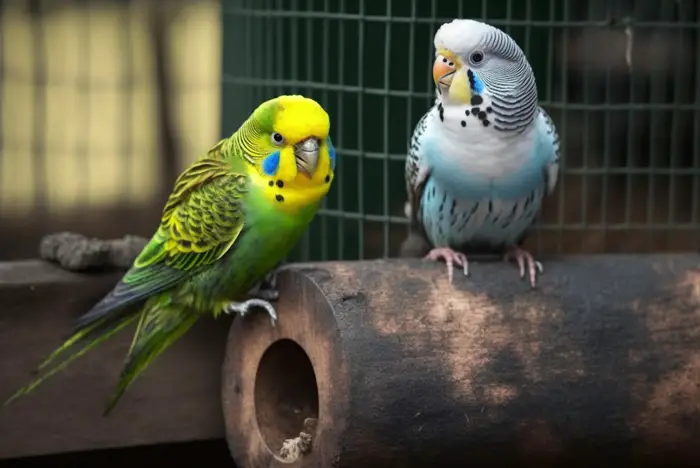
- Water bowls are simple and easy to use. However, they can become easily contaminated with food, droppings, and other debris.
- Conversely, water bottles are less likely to become infected, but they may require more maintenance and can be difficult for some budgies to use.
- Regardless of which type of water dispenser you choose, it is essential to monitor your budgie’s water intake and ensure that they are drinking enough. The average budgie requires about 30-50 milliliters of water daily, depending on its size and activity level.
- You can monitor your budgie’s water intake by observing how much they drink and checking the water level in their dispenser daily.
- You can also offer your budgie water-rich foods, such as fruits and vegetables. Some examples include cucumber, celery, and melon. Just wash fruits or vegetables thoroughly and remove any seeds or pits that could harm your budgie.
Finally, it is essential to clean your budgie’s water dispenser regularly. This helps to maintain good water quality and prevent bacterial growth. If using a water bowl, it should be changed and washed daily, and any debris or food should be removed promptly.
Water bottles should be cleaned weekly with hot, soapy water. The spout should also be thoroughly rinsed to remove any residue. Replacing your budgie’s water at least once daily ensures it remains fresh and clean.
FAQs
Here are other related questions.
Yes. While water is the primary source of hydration for budgies, they may occasionally drink other liquids like unsweetened fruit juice or diluted electrolyte solutions.
You should change your budgie’s water at least once a day. It’s best to clean the water dispenser daily using hot, soapy water and a scrub brush to remove bacteria or buildup. Rinse thoroughly with clean water and allow the dispenser to dry before refilling it with fresh water.
Yes. Budgies can eat some types of human food, but ensuring it is safe and nutritionally balanced is essential. Safe human foods for budgies include fresh fruits and vegetables like apples, bananas, carrots, and leafy greens. However, you should avoid feeding them chocolate, avocados, caffeine, and salty or sugary foods.
If your budgie is not getting enough nutrition or hydration, you may notice signs like weight loss, reduced activity and energy, fluffed-up feathers, dry or scaly skin, and changes in their droppings.
Yes, budgies can become obese and develop other health issues if they are overfed. To avoid overfeeding, keep track of your budgie’s food intake and limit high-fat foods like seeds and nuts. You should also give your budgie plenty of opportunities to exercise and stay active.
Conclusion
Proper nutrition and hydration are crucial for the health and well-being of your budgie. A balanced diet with various seeds, pellets, fruits, and vegetables ensures your budgie gets all the necessary nutrients. Regular weight and overall health monitoring are also vital to ensure they get enough nutrition and hydration.
Additionally, providing fresh, clean water is vital. Ensure you regularly clean the dispensers to maintain water quality and prevent bacterial growth. It is important to remember that different feeding and watering methods work for other budgies, and paying attention to their behavior and needs is essential.
Many resources are available online and in print if you want to learn more about budgie nutrition and care. Consult with an avian veterinarian, read books, or join online forums to connect with other budgie owners. That way, you can learn how to give your budgie the best care possible.
